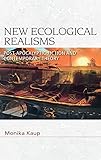New Ecological Realisms : Post-Apocalyptic Fiction and Contemporary Theory / Monika Kaup.
Material type: TextSeries: Speculative Realism : SPREPublisher: Edinburgh : Edinburgh University Press, [2022]Copyright date: ©2021Description: 1 online resource (352 p.) : 2 B/W illustrationsContent type:
TextSeries: Speculative Realism : SPREPublisher: Edinburgh : Edinburgh University Press, [2022]Copyright date: ©2021Description: 1 online resource (352 p.) : 2 B/W illustrationsContent type: - 9781474483094
- 9781474483117
- 809.39372 23
- online - DeGruyter
| Item type | Current library | Call number | URL | Status | Notes | Barcode | |
|---|---|---|---|---|---|---|---|
 eBook
eBook
|
Biblioteca "Angelicum" Pont. Univ. S.Tommaso d'Aquino Nuvola online | online - DeGruyter (Browse shelf(Opens below)) | Online access | Not for loan (Accesso limitato) | Accesso per gli utenti autorizzati / Access for authorized users | (dgr)9781474483117 |
Frontmatter -- Contents -- Series Editor’s Preface -- Acknowledgements -- Introduction -- 1 New Ecological Realisms and Post-Apocalyptic Fiction -- 2 The New Realism of the Factish and the Political Ecology of Humans and Non-Humans: Bruno Latour and Margaret Atwood’s MaddAddam Trilogy -- 3 The Ontology of Knowledge as the Enaction of Mind and World: Humberto Maturana and Francisco Varela’s Autopoietic Theory and José Saramago’s Blindness -- 4 Apocalypse as Field of Sense: Markus Gabriel’s Ontology of Fields of Sense and Octavia Butler’s Parable Series -- 5 New Phenomenologies after Poststructuralism (Jean-Luc Marion and Alphonso Lingis) and Cormac McCarthy’s The Road -- Bibliography -- Index
restricted access online access with authorization star
http://purl.org/coar/access_right/c_16ec
Presents post-apocalyptic fiction as a unique source of new realist ontologiesShows how new realism reshapes humanistic inquiry in the age of climate changeContributes to the rehabilitation and reframing of realism after postmodernismIntroduces a new contextual and ecological realism that reconnects the human cultural world with non-humans and the environmentWhat is the singular reality of humanistic objects of study? By pairing post-apocalyptic novels by Margaret Atwood, José Saramago, Octavia Butler and Cormac McCarthy with new realist theories, Monika Kaup shows that, just as new realist theory can illuminate post-apocalyptic literature, post-apocalyptic literature also embeds new theories of the real.Kaup showcases a context-based concept of the real, arguing that new realisms of complex and embedded wholes, actor-networks and ecologies, rather than old realisms of isolated parts and things, represent the most promising escape from the impasses of constructivism and positivism. To achieve this, Kaup brings together contemporary theories that formulate context-based realisms: Bruno Latour’s actor-network theoryChilean neurophenomenologists Humberto Maturana and Francisco Varela’s theories of autopoiesis and enactivismGerman philosopher Markus Gabriel’s new ontology of fields of senseFrench philosopher Jean-Luc Marion’s phenomenology of givennessAmerican philosopher Alphonso Lingis’s phenomenology of passionate identification
Mode of access: Internet via World Wide Web.
In English.
Description based on online resource; title from PDF title page (publisher's Web site, viewed 25. Jun 2024)


